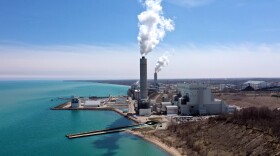One candidate who was not a part of last night’s debate was James Webb. That makes sense, since he’s a Democrat. The DNC announced its primary debate schedule yesterday, which includes a total of six debates, including one in Wisconsin. Webb announced his candidacy just before Independence Day, which Lake Effect essayist Art Cyr thinks is significant:
Webb’s Vietnam War novel “Fields of Fire,” published in 1978, is generally recognized as one of the best to result from that war.
Webb writes from direct experience. After graduation from the U.S. Naval Academy at Annapolis, he attended Marine Corps officer training, graduating first in his class. He served as a platoon and company commander, and was awarded the Navy Cross, the Silver Star Medal, two Bronze Star Medals and two Purple hearts.
As presidential contender, he can address problems of national security and defense from the perspective of actual experience in the inferno of war. Polls long-term show the Republicans are generally favored over the Democrats in this dimension. Win or lose, Webb can help right the imbalance.
The Fourth of July weekend celebrates community, local as well as national. Parades featuring people in uniform - scouts, firefighters and police as well as the military – traditionally are central features.
On elementary and sophisticated levels, Webb is capable of adding a depth and maturity to defense debate which is remarkably absent in contemporary public discussion. More than ever before, the U.S. military is segregated from wider society.
The integration of military and civilian society remains as important today as in ancient times. Homer, the poet of ancient Greece, presented his saga of war and recovery in two parts. “The Iliad” focuses on the fighting and related interchange between Greeks and Trojans. “The Odyssey” describes the very long voyage home of Greek leader Ulysses and his men. They traverse allegorical geography, struggling to put the horrors of killing, and the dangers of being killed, behind them.
Gen. George S. Patton Jr., a very great American combat leader, was extremely mindful of this dimension, despite being accurately described by both admirers and critics as the personification of a “pure” warrior. He and Gen. James Doolittle, who led the first air raid on Tokyo, were featured in a special ceremony in the Los Angeles Coliseum after the surrender of Nazi Germany.
Patton celebrated the accomplishments of our U.S. Third Army in the victorious drive across Europe. In honoring his troops, he stressed in particular the 40,000 who lost their lives in that final year of the war. He repeated the theme in the few months remaining until his own death. Patton sensed the vital importance of celebration for reintegration, and personal renewal.
Warriors from modern democracies face a great awareness gulf. President Richard Nixon ended the military draft. This relieved domestic U.S. political turmoil short-term, and increased military effectiveness long-term, but also has contributed to the marked decline of public sophistication regarding the military. A pro forma “Thank you for your service” only serves to underscore that contemporary insulation.
Encourage veterans to run for public office. We won the Cold War in part because members of Tom Brokaw’s “Greatest Generation” who served in the military also served in government. Every U.S. President from Harry Truman through George H.W. Bush was a veteran.
Washington needs the sort of sensible realism such men and women can bring to policy. Jim Webb just by running provides a bridge.
Essayist Art Cyr is professor of political economy and world business at Carthage College in Kenosha, and author of the book, After the Cold War.






